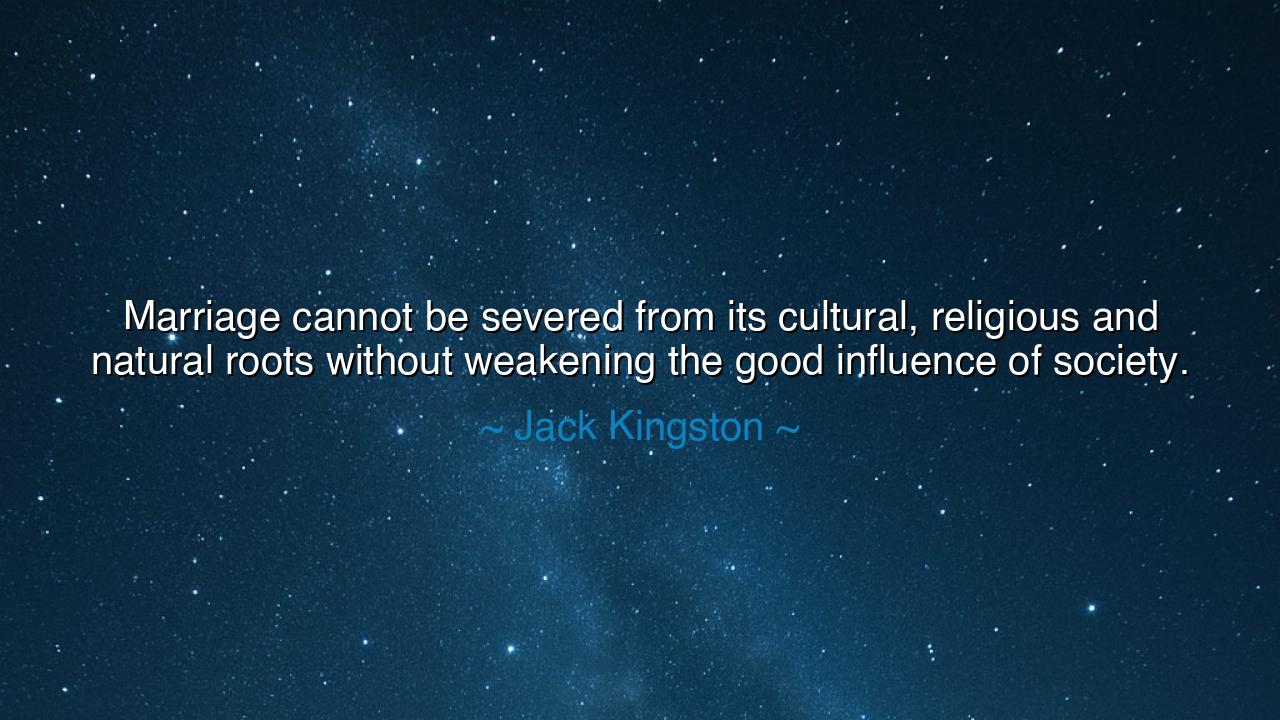
Marriage cannot be severed from its cultural, religious and
Marriage cannot be severed from its cultural, religious and natural roots without weakening the good influence of society.






When Jack Kingston declared, “Marriage cannot be severed from its cultural, religious, and natural roots without weakening the good influence of society,” he spoke not merely as a politician, but as a guardian of memory — one who sensed that the foundations of civilization rest upon the stability of the home. His words are a warning wrapped in reverence, reminding us that marriage, in its truest form, is not just a contract between two people, but a covenant between generations. To tear it away from the soil that nourished it — from faith, from tradition, from nature itself — is to endanger the moral harvest of society.
The origin of this quote lies in Kingston’s defense of traditional marriage during the early 21st-century debates over social reform in America. As a congressman from Georgia, he spoke during a time when the definition of marriage was being widely reexamined, and his words reflected his belief that the strength of a nation begins in the unity of its families. But beyond the context of political discourse, Kingston’s statement carries an ancient and universal wisdom: that institutions endure only when they remain rooted in the truths that first gave them life. Just as a tree with severed roots cannot stand, so too, he suggests, a society that forgets the sacred origins of marriage will find itself weakened in spirit, purpose, and peace.
Throughout history, marriage has been more than personal affection — it has been the cornerstone of community, the crucible of morality, and the vessel of civilization’s continuity. The ancients saw in it a reflection of cosmic order. The Greeks spoke of oikos, the household, as the smallest yet most sacred unit of the state; the Romans built their laws upon the paterfamilias, the keeper of lineage and virtue. Even the great philosopher Confucius taught that harmony in the empire begins with harmony in the home. Thus, Kingston’s statement is not bound to his time or place — it stands among the timeless truths of humankind: that the strength of a nation rises or falls with the strength of its families.
History offers us a mirror in the story of Rome’s decline, when the sanctity of family eroded beneath indulgence and self-interest. As marriage lost its sacred weight, bonds between generations weakened, children were left unguided, and the empire, though vast and powerful, crumbled from within. The ancients understood what Kingston reminds the modern world: that marriage, when rooted in shared belief and natural order, acts as the unseen architecture of society — a structure that upholds justice, compassion, and stability. When that structure collapses, no government or army can rebuild what the heart has forsaken.
Yet Kingston’s words are not a lament alone; they are also a call to remembrance. He invites us to look beyond the shifting winds of modern culture and recall what makes marriage sacred: commitment, faith, and continuity. These are not chains that bind love, but the soil that allows it to flourish. To marry is to enter a garden of both joy and duty, to cultivate something that endures beyond the passions of the moment. A love unrooted may bloom brightly for a season, but like a flower cut from its stem, it cannot live long. True love, like true marriage, draws its strength from the deep waters of tradition, sacrifice, and reverence.
In this sense, Kingston’s vision is not one of oppression or nostalgia, but of balance — a harmony between freedom and foundation. The world may evolve, customs may change, yet the human heart still seeks the same things it has sought since the dawn of time: to love, to belong, to build a life that matters. When marriage remains anchored in its cultural and spiritual roots, it becomes not only a personal bond but a public blessing — a source of stability for children, a shield against despair, and a light to guide the generations that follow.
Let this teaching endure: to preserve the good influence of society, one must honor the sacred origins of love and family. Every generation inherits not only freedoms, but responsibilities — to cherish what is timeless, even as it embraces what is new. Let husbands and wives remember that their union is not a fleeting partnership, but a link in the unbroken chain of humanity. For as long as marriage remains rooted in the eternal — in faith, in nature, in shared virtue — the world will find its strength renewed, and society will flourish like a tree planted beside still waters, whose leaves do not wither, and whose fruit nourishes the future.






AAdministratorAdministrator
Welcome, honored guests. Please leave a comment, we will respond soon